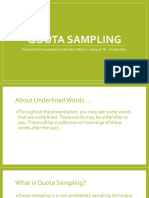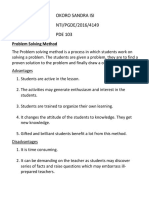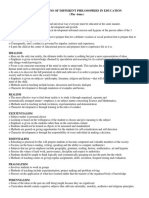0 ratings0% found this document useful (0 votes)
508 viewsCritical Thinking
Critical Thinking
Uploaded by
ginaCritical thinking is the ability to analyze one's own thinking and present evidence rather than just personal reasoning. It involves self-directed thinking that is self-disciplined, self-monitored, and self-corrective. Critical thinking skills are valuable for students both in academics and life, helping to solve problems, think creatively, enhance comprehension and reflection skills, and promote independent learning. Critical thinking is important for science, liberal democracies, and lifelong learning.
Copyright:
© All Rights Reserved
Available Formats
Download as DOCX, PDF, TXT or read online from Scribd
Critical Thinking
Critical Thinking
Uploaded by
gina0 ratings0% found this document useful (0 votes)
508 views4 pagesCritical thinking is the ability to analyze one's own thinking and present evidence rather than just personal reasoning. It involves self-directed thinking that is self-disciplined, self-monitored, and self-corrective. Critical thinking skills are valuable for students both in academics and life, helping to solve problems, think creatively, enhance comprehension and reflection skills, and promote independent learning. Critical thinking is important for science, liberal democracies, and lifelong learning.
Original Description:
Original Title
critical thinking
Copyright
© © All Rights Reserved
Available Formats
DOCX, PDF, TXT or read online from Scribd
Share this document
Did you find this document useful?
Is this content inappropriate?
Critical thinking is the ability to analyze one's own thinking and present evidence rather than just personal reasoning. It involves self-directed thinking that is self-disciplined, self-monitored, and self-corrective. Critical thinking skills are valuable for students both in academics and life, helping to solve problems, think creatively, enhance comprehension and reflection skills, and promote independent learning. Critical thinking is important for science, liberal democracies, and lifelong learning.
Copyright:
© All Rights Reserved
Available Formats
Download as DOCX, PDF, TXT or read online from Scribd
Download as docx, pdf, or txt
0 ratings0% found this document useful (0 votes)
508 views4 pagesCritical Thinking
Critical Thinking
Uploaded by
ginaCritical thinking is the ability to analyze one's own thinking and present evidence rather than just personal reasoning. It involves self-directed thinking that is self-disciplined, self-monitored, and self-corrective. Critical thinking skills are valuable for students both in academics and life, helping to solve problems, think creatively, enhance comprehension and reflection skills, and promote independent learning. Critical thinking is important for science, liberal democracies, and lifelong learning.
Copyright:
© All Rights Reserved
Available Formats
Download as DOCX, PDF, TXT or read online from Scribd
Download as docx, pdf, or txt
You are on page 1of 4
At a glance
Powered by AI
The key takeaways are that critical thinking involves analyzing your own reasoning, considering different perspectives, and using evidence to support your ideas. It also allows you to learn better and problem solve effectively.
You can gain better control over your own learning, empathy for other views, effective communication and problem solving skills, and the ability to overcome biases.
Critical thinking enhances language, presentation, comprehension, and creativity skills by helping you express ideas clearly and systematically while also generating useful new ideas.
Critical Thinking is the ability to analyze the way you think and
present evidence for your ideas, rather than simply accepting your
personal reasoning as sufficient proof. You can gain numerous
benefits from mastering critical thinking skills, such as better control
of your own learning and empathy for other points of view.
Critical Thinking is, in short, self-directed, self-disciplined, self-
monitored, and self-corrective thinking. It presupposes assent to
rigorous standards of excellence and mindful command of their use. It
entails effective communication and problem solving abilities and a
commitment to overcome our native egocentrism and sociocentrism.
From solving problems in class assignments to facing real world
situations, Critical Thinking is a valuable skill for students to master.
Critical Thinking skills teach a variety of skills that can be applied to
any situation in life that calls for reflection, analysis and planning.
Critical Thinking enhances language and presentation skills. Thinking
clearly and systematically can improve the way we express our ideas.
In learning how to analyse the logical structure of texts, critical
thinking also improves comprehension abilities.
Critical Thinking promotes creativity. To come up with a creative
solution to a problem involves not just having new ideas. It must also
be the case that the new ideas being generated are useful and relevant
to the task at hand. Critical thinking plays a crucial role in evaluating
new ideas, selecting the best ones and modifying them if necessary
Critical Thinking is crucial for self-reflection. In order to live a
meaningful life and to structure our lives accordingly, we need to
justify and reflect on our values and decisions. Critical thinking
provides the tools for this process of self-evaluation.
Good Critical Thinking is the foundation of science and a liberal
democratic society. Science requires the critical use of reason in
experimentation and theory confirmation. The proper functioning of a
liberal democracy requires citizens who can think critically about
social issues to inform their judgments about proper governance and
to overcome biases and prejudice.
Critical Thinking is something that is valued both in the university
setting and in the professional situations you will find yourselves in
after you graduate, and is part of lifelong learning. Critical Thinking is
important in life. It helps you to think creatively – ‘outside the box’. It
keeps you from becoming narrow. Critical Thinking is expected of
you in higher education. It can lead to developing your judgement,
evaluation and problem solving abilities.
Learning Critical Thinking skills can also enhance your academic
performance. According to Linda Elder and Richard Paul, authors of
“Critical Thinking Development: A Stage Theory,” students who
know how to analyze and critique ideas are able to make connections
across disciplines, see knowledge as useful and applicable to daily life
and understand content on a deeper, more lasting level.
Rather than relying on teachers and classroom time for instruction
and guidance, students with critical thinking skills become more
independent, self-directed learners. Researcher Jane Qinjuan Zhang
writes that critical thinking enables students to assess their learning
styles, strengths and weaknesses, and allows them to take ownership
of their education.
All Entrance exams examine a students’ ability to think critically. As a
matter of fact, the analytical and verbal reasoning skills sections of the
GRE exams are straight out exams founded on testing Critical
Thinking skills. So is the Written Analysis and Communication test in
the second phase of IIMA entrance exams. The skills developed in
Critical Thinking directly help students do better even at the
Mathematical reasoning tests.
Today one of the most important criteria for success in College is the
ability to think independently while being logical at the same time.
Often students are asked to present papers either on their subject
matter or in liberal arts. Knowledge of Critical Thinking Skills enables
students to not only outline their papers coherently with a logical
structure, it also helps them reason and present their thoughts in an
organized and persuasive manner.
A good critical thinker knows how to separate facts from opinions,
how to examine an issue from all sides, how to make rational
inferences and how to withhold personal judgment or biases.
Rational critical thinkers are generally the voices of reason in times of
mass hysteria or panic. As Franklin D. Roosevelt said, “We have
nothing to fear but fear itself.” The critical thinker usually has the
comprehensive skills to consider all possible options and solve a
problem.
The critical thinker remains calm and knows when he is right. Critical
thinkers are
You might also like
- Lesson Plan in Marketing MixDocument4 pagesLesson Plan in Marketing Mixgina100% (3)
- The Role of Theory in Research PDFDocument21 pagesThe Role of Theory in Research PDFElena Ungureanu67% (3)
- Critical ReadingDocument22 pagesCritical Readingkeny estigoyNo ratings yet
- Week 3 Strategic Analysis and Intuitive ThinkingDocument19 pagesWeek 3 Strategic Analysis and Intuitive Thinkinggina100% (3)
- Critical Thinking ComponentsDocument12 pagesCritical Thinking Componentsjuliana punayNo ratings yet
- 4 Purposes of AssessmentDocument6 pages4 Purposes of Assessmentjomar lipaopaoNo ratings yet
- Quota Sampling: Powerpoint Presentation by Theodore Albert L. Lising of Vii - ArchimedesDocument28 pagesQuota Sampling: Powerpoint Presentation by Theodore Albert L. Lising of Vii - ArchimedesButch LisingNo ratings yet
- Assessment in Leaerning 2Document6 pagesAssessment in Leaerning 2Renalyn Arpon AdizasNo ratings yet
- Module 1Document5 pagesModule 1John Mark BondocNo ratings yet
- Problem Solving MethodDocument4 pagesProblem Solving MethodOghale OkoroNo ratings yet
- Assessment in The Affective DomainDocument63 pagesAssessment in The Affective DomainAlmira A. Mira-atoNo ratings yet
- 14 Rules For Writing Multiple-Choice QuestionsDocument5 pages14 Rules For Writing Multiple-Choice Questionsapi-322360160No ratings yet
- Primary & Secondary SourcesDocument2 pagesPrimary & Secondary SourcesMarjorie DodanNo ratings yet
- Parallel Curriculum Model - AMMDocument54 pagesParallel Curriculum Model - AMMjarisco123No ratings yet
- Blooms TaxonomyDocument36 pagesBlooms TaxonomyMuniba ArshadNo ratings yet
- Critical LiteracyDocument4 pagesCritical LiteracySegundo R. Perez CuarteNo ratings yet
- Cognitive Theories of LearningDocument44 pagesCognitive Theories of LearningSarah Lombres Antigua Montefalco100% (1)
- Evaluation Part 1Document21 pagesEvaluation Part 1saravanamoorthyNo ratings yet
- Team Teaching and Micro TeachingDocument4 pagesTeam Teaching and Micro TeachingMuqadus MumatzNo ratings yet
- Meaningful Learning ModelDocument2 pagesMeaningful Learning ModelJOSH NICOLE PEPITONo ratings yet
- Lesson 2-Curriculum FrameworkDocument4 pagesLesson 2-Curriculum FrameworkVan Errl Nicolai SantosNo ratings yet
- Performance Assessment of Process and Product: Learning OutcomesDocument15 pagesPerformance Assessment of Process and Product: Learning OutcomesJohn Roland CruzNo ratings yet
- Lesson 8Document12 pagesLesson 8daisy bolasocNo ratings yet
- Ethics MidtermDocument6 pagesEthics MidtermJosh CookNo ratings yet
- The Four Major Types of Educational PhilosophiesDocument1 pageThe Four Major Types of Educational Philosophiesjaz hoodNo ratings yet
- Five Frames of Thinking (Vanessa Keith Pasco)Document3 pagesFive Frames of Thinking (Vanessa Keith Pasco)Vanessa Keith Matildo-Pasco QuiocoNo ratings yet
- Principles in Curriculum DevelopmentDocument1 pagePrinciples in Curriculum Development昕祤No ratings yet
- Assure Model For LearnerDocument3 pagesAssure Model For LearnerAtanu NandiNo ratings yet
- The Revised Bloom's Taxonomy of Educational ObjectivesDocument18 pagesThe Revised Bloom's Taxonomy of Educational ObjectivesMaria Elena Musa100% (1)
- My 16pf ReflectionDocument7 pagesMy 16pf ReflectionEmi LyNo ratings yet
- Ict Animation NC II 20151119Document16 pagesIct Animation NC II 20151119JennySorinoBacalso100% (1)
- What Is A Counter-Argument?Document8 pagesWhat Is A Counter-Argument?Xiao NaNo ratings yet
- Summary of AssessmentDocument3 pagesSummary of AssessmentLia Sulistiawati100% (1)
- PED07 Lesson 7 BSED IIIDocument2 pagesPED07 Lesson 7 BSED IIIglezamaeNo ratings yet
- Domain: AffectiveDocument11 pagesDomain: AffectiveUser LeftNo ratings yet
- Getting To Know Autonomous LearningDocument4 pagesGetting To Know Autonomous LearningRani FalantikaNo ratings yet
- Components of Daily Lesson PlansDocument1 pageComponents of Daily Lesson Plansapi-357377076No ratings yet
- Importance and Benefits of Learning OutcomesDocument4 pagesImportance and Benefits of Learning OutcomesKim LabradorNo ratings yet
- Course Outline PDFDocument12 pagesCourse Outline PDFBelen HumiwatNo ratings yet
- Personality MeaningDocument12 pagesPersonality MeaningReina100% (1)
- Applications of Different Philosophies in EducationDocument2 pagesApplications of Different Philosophies in EducationClifford BorromeoNo ratings yet
- Learning TargetsDocument39 pagesLearning TargetsCarlo MagnunNo ratings yet
- Pre-Assessment or Diagnostic Assessment: Formative and Summative AssessmentsDocument3 pagesPre-Assessment or Diagnostic Assessment: Formative and Summative AssessmentsFaizal Usop PatikamanNo ratings yet
- Assignement 2Document3 pagesAssignement 2Ma Vanessa Rose TacuyanNo ratings yet
- What Is A Performance TaskDocument38 pagesWhat Is A Performance TaskMiziana Suhana Binti Saboo IPGKPINo ratings yet
- LESSON 1 - Technology For Teaching and LearningDocument15 pagesLESSON 1 - Technology For Teaching and LearningCyrill Mico De GuzmanNo ratings yet
- Basic Concept in AssessmentDocument4 pagesBasic Concept in AssessmentC.espesoNo ratings yet
- Entrepreneurial CompetenciesDocument7 pagesEntrepreneurial Competenciesamit_sepl100% (1)
- Group LearningDocument50 pagesGroup Learninggayathriv2121 VijayalakshmiNo ratings yet
- Module 3 - Characteristics of 21 Century Teaching and LearningDocument7 pagesModule 3 - Characteristics of 21 Century Teaching and LearningJoan DomagasNo ratings yet
- GMRC FINAL REQ. Leslie D. AbalorioDocument7 pagesGMRC FINAL REQ. Leslie D. AbalorioLyzlie DoblonNo ratings yet
- Portfolio Assessment: Key PointsDocument3 pagesPortfolio Assessment: Key Pointspatricia macabantiNo ratings yet
- Rubrics For AssessmentDocument6 pagesRubrics For AssessmentNoor Khairul Azwan100% (3)
- Lesson 2, Topic 2Document12 pagesLesson 2, Topic 2Janaica lace pitpitNo ratings yet
- Abrams Annotated BibliographyDocument6 pagesAbrams Annotated BibliographyBenjamin AbramsNo ratings yet
- Biggs Constructive AlignmentDocument12 pagesBiggs Constructive AlignmentWellington MendesNo ratings yet
- MODULE 5 Feminism, Marxism, and Post-ColonialismDocument5 pagesMODULE 5 Feminism, Marxism, and Post-ColonialismHaniel SalamanesNo ratings yet
- NTC PsychometDocument30 pagesNTC Psychometchester chesterNo ratings yet
- Learning Styles and Multiple Intelligences in StudentsDocument4 pagesLearning Styles and Multiple Intelligences in StudentsPaulNo ratings yet
- Handbook of Research on TeachingFrom EverandHandbook of Research on TeachingCourtney BellNo ratings yet
- Governance and the Three Arms of Government in Sierra LeoneFrom EverandGovernance and the Three Arms of Government in Sierra LeoneNo ratings yet
- Ashley Rae Louise A. Andolero ABM 12-1Document2 pagesAshley Rae Louise A. Andolero ABM 12-1Ashley Rae Louise AndoleroNo ratings yet
- WHLP Trends Network Week 1Document4 pagesWHLP Trends Network Week 1ginaNo ratings yet
- Weekly Learning Plan WEEK 1Document3 pagesWeekly Learning Plan WEEK 1ginaNo ratings yet
- DLP TRENDS Q4 - ICT Dimension, Benefits and ChallengesDocument8 pagesDLP TRENDS Q4 - ICT Dimension, Benefits and ChallengesginaNo ratings yet
- DLP TRENDS - Consequences of Action To Global Climate ChangeDocument9 pagesDLP TRENDS - Consequences of Action To Global Climate ChangeginaNo ratings yet
- Empowerment Technologies Module For Week 6 7Document12 pagesEmpowerment Technologies Module For Week 6 7ginaNo ratings yet
- Empowerment Technologies Q2 Module 6Document40 pagesEmpowerment Technologies Q2 Module 6ginaNo ratings yet
- Empowerment Technologies Module2 4Document56 pagesEmpowerment Technologies Module2 4ginaNo ratings yet
- Detailed Lesson Plan CotDocument7 pagesDetailed Lesson Plan CotginaNo ratings yet
- Is This Source Reliable?: Checklist: Evaluating SourcesDocument2 pagesIs This Source Reliable?: Checklist: Evaluating SourcesDiego SingsonNo ratings yet
- Faci Demo script-EPGDocument12 pagesFaci Demo script-EPGMELANIE IBARDALOZANo ratings yet
- 0447 Cambridge IGCSE India Studies 2012 SyllabusDocument28 pages0447 Cambridge IGCSE India Studies 2012 Syllabusderickkachula53No ratings yet
- How+to+Start+Preparing+for+JEE NEET+From+Class+9th 10th+Document39 pagesHow+to+Start+Preparing+for+JEE NEET+From+Class+9th 10th+Ashutosh Kr. Sahuwala 7bNo ratings yet
- TEZU Prospectus-4-UploadDocument202 pagesTEZU Prospectus-4-UploadagnibeshNo ratings yet
- Pharmacy 2nd and 3rd Year SyllabusDocument64 pagesPharmacy 2nd and 3rd Year SyllabusSugam BhattaraiNo ratings yet
- Difference Between ADDIE and DICK and CAREY (VENN DIAGRAM)Document1 pageDifference Between ADDIE and DICK and CAREY (VENN DIAGRAM)MichaelBernard VelezZambranoNo ratings yet
- WISC V Research ReportDocument42 pagesWISC V Research Reportshavira dian nazwaNo ratings yet
- 15 Selected Assess Tools For ASDDocument15 pages15 Selected Assess Tools For ASDSrinivas Achary100% (1)
- Project Progression RecordDocument7 pagesProject Progression Recordapi-654240774No ratings yet
- CTP Vocational Training: Institute of Occupational Safety and Health (IOSH) Managing SafelyDocument2 pagesCTP Vocational Training: Institute of Occupational Safety and Health (IOSH) Managing SafelybachirNo ratings yet
- Table For Comparison of Formative and Summative Assessments - Chelsea HammonsDocument4 pagesTable For Comparison of Formative and Summative Assessments - Chelsea Hammonsapi-632874913No ratings yet
- Admit Card NeetDocument4 pagesAdmit Card Neetsehamaftab44No ratings yet
- Mettu University Bedele College of Agriculture and Forestry Seminar Submission Approval Form (F-1)Document3 pagesMettu University Bedele College of Agriculture and Forestry Seminar Submission Approval Form (F-1)Ayana Yoseph100% (1)
- pr2 Q2 WEEK 3 LAS 1 &2Document4 pagespr2 Q2 WEEK 3 LAS 1 &2ENJELY SIMBANANNo ratings yet
- Aqa Textiles Coursework Mark SchemeDocument4 pagesAqa Textiles Coursework Mark Schemenjoqvnjbf100% (2)
- Qualitative Data AnalysisDocument10 pagesQualitative Data AnalysisKeithNo ratings yet
- Innovation in Teaching and Learning InstrumentationDocument28 pagesInnovation in Teaching and Learning InstrumentationumashankaryaligarNo ratings yet
- Exam Card - FULDocument1 pageExam Card - FULAliyahNo ratings yet
- Ocr English Literature Coursework Grade Boundaries 2014Document8 pagesOcr English Literature Coursework Grade Boundaries 2014nub0vomygun2100% (1)
- TOEFL Writing: Test Preparation and StrategiesDocument5 pagesTOEFL Writing: Test Preparation and Strategiessofia londoñoNo ratings yet
- Syllabus Operations MGMTDocument13 pagesSyllabus Operations MGMTCorine Joy TapoNo ratings yet
- Practical 4 Kaashvi Dubey Psybsc18038 1Document7 pagesPractical 4 Kaashvi Dubey Psybsc18038 1kaashvi dubeyNo ratings yet
- Teaching Millennials How To Study Under The 21 Century Sky: Original Research ArticleDocument9 pagesTeaching Millennials How To Study Under The 21 Century Sky: Original Research ArticleMiftahul RahmahNo ratings yet
- Institute of Teacher Education Syllabus in Purposive CommunicationDocument14 pagesInstitute of Teacher Education Syllabus in Purposive CommunicationJE QUESTNo ratings yet
- Task 1.1 - Test - Evaluation QuizDocument5 pagesTask 1.1 - Test - Evaluation QuizDiana Marcela AgredoNo ratings yet
- T2E GR10 Probability 2020-2021Document3 pagesT2E GR10 Probability 2020-2021Anto WillNo ratings yet
- Maniba Bhula Nursing College: Department of Child Health NursingDocument1 pageManiba Bhula Nursing College: Department of Child Health Nursingmehta shivaniNo ratings yet
- Assessment and EvaluationDocument66 pagesAssessment and EvaluationMagda Edith Castro ZegarraNo ratings yet
- Ce Hydrology 1Document8 pagesCe Hydrology 1Thur MykNo ratings yet



































































































